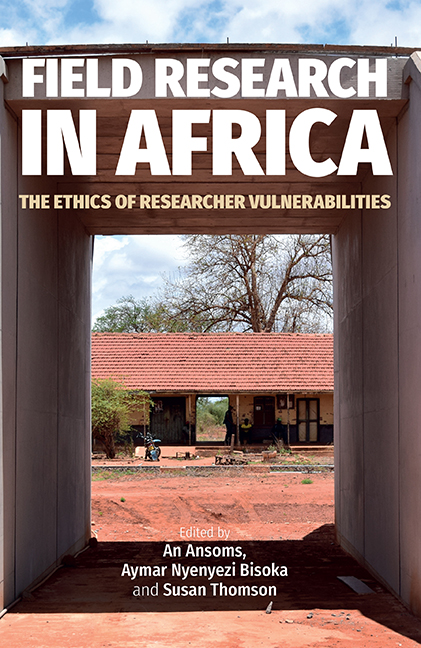Book contents
- Frontmatter
- Contents
- List of Contributors
- Foreword: It is about Us
- Map of Africa showing Fields of Research
- Introduction: Fields of Vision, Emotion as Reflexivity
- 1 Skin Connections: Negotiating Institutional Ethics alongside Insider Identities
- 2 Conducting Sensitive Research ‘At Home’: A Matter of Responsibility
- 3 A Gendered Research Journey: Ethical Dilemmas of an Algerian Immigrant Recovering the Memory of ‘Home'
- 4 Establishing Kinship in the Diaspora: Conducting Research among Fellow Congolese Immigrants of Cape Town
- 5 ‘If they find out, we're dead': Intermediaries, Self-censorship, and Anxiety in Research as an Outsider-Insider
- 6 Looking Behind the Screen: Ethical Quagmires when Accessing Hidden Discourses
- 7 Scholar-Activist? On Relational Accountability and an Ethic of Dissemination
- Conclusion: Theorising Self as Ethical Research Practice
- Bibliography
- Index
3 - A Gendered Research Journey: Ethical Dilemmas of an Algerian Immigrant Recovering the Memory of ‘Home'
Published online by Cambridge University Press: 10 June 2021
- Frontmatter
- Contents
- List of Contributors
- Foreword: It is about Us
- Map of Africa showing Fields of Research
- Introduction: Fields of Vision, Emotion as Reflexivity
- 1 Skin Connections: Negotiating Institutional Ethics alongside Insider Identities
- 2 Conducting Sensitive Research ‘At Home’: A Matter of Responsibility
- 3 A Gendered Research Journey: Ethical Dilemmas of an Algerian Immigrant Recovering the Memory of ‘Home'
- 4 Establishing Kinship in the Diaspora: Conducting Research among Fellow Congolese Immigrants of Cape Town
- 5 ‘If they find out, we're dead': Intermediaries, Self-censorship, and Anxiety in Research as an Outsider-Insider
- 6 Looking Behind the Screen: Ethical Quagmires when Accessing Hidden Discourses
- 7 Scholar-Activist? On Relational Accountability and an Ethic of Dissemination
- Conclusion: Theorising Self as Ethical Research Practice
- Bibliography
- Index
Summary
RESEARCH, AS A socially mediated process, is a socio-cognitive experience where ethical questions are intertwined with the production and interpretation of data (Gaudet and Robert 2018; Sabourin 1997). Thus, ethics are constantly navigated alongside epistemological, methodological, and theoretical paths (Genard and Roca i Escoda 2014; Maunier 2017). Yet, when research is socially located at the crossroads of one's personal and professional lives, ethical protocols become a type of autoethnography (Butz and Besio 2009, 1660). This practice of self-representation was first defined by Reed-Danahay (1997, 9) as a ‘form of self-narrative that places the self within a social context’, in order to trace both the effects of social mediation on the knowledge produced, and on ‘our constitution as researching subjects’ through them. Such critical (or doubled) reflexivity, as an ‘identity-work’ being done ‘self-consciously’, may bring us to a transcultural moment, articulated in relation to oneself and the wider social field that includes an audience of ‘others’. This puts the agents of signification (academics) and its objects (research subjects) as opposite poles on a continuum. Butz and Besio (2009, 1660), who share the common use of subjectivity as an epistemological resource, describe five types of autoethnographies that represent a variety of ‘self-representational’ practices in which authors ‘cross, straddle, or inhabit the boundary between non-academic and academic subject positionings’.
Throughout my chapter, I define critical reflexivity as a ‘self-critical sympathetic introspection and the self-conscious analytical scrutiny of the self as researcher’ (England 1994, 82). This framing helps me locate the contradictions in my identity that occurred as I navigated different forms of social mediation during my research on women's spatial mobility in my native suburbs of Algiers. Returning to a ‘home’ that my family and I had left seventeen years earlier, fieldwork as a process has triggered for me a continuous subjective movement between myself and my ‘double’, both as an individual and as a researcher (Mbembe 2013). Therefore, critical reflexivity helped me understand how my multi-situated position has evolved, as new social mediations occurred, finally breaking out as a ‘travelling identity’ of a transcultural subject (Mbembe 2013, 145).
- Type
- Chapter
- Information
- Field Research in AfricaThe Ethics of Researcher Vulnerabilities, pp. 45 - 62Publisher: Boydell & BrewerPrint publication year: 2021



